The Fast 800 is flexible. All three approaches follow the principles of a moderately low-carb, Mediterranean-style diet. You can switch easily between each approach as your needs change – some people start with The Very Fast 800 (our 800 calorie diet) if they have a significant amount of weight to lose, or to kick start weight loss, while others start with The New 5:2 or The Way of Life for gradual weight loss or to improve their overall health.
Flexibility and finding what works for you are pivotal in maintaining a long-term, sustainable lifestyle. The Fast 800 is designed to complement your life and any event, holiday or challenge that comes with it.
An 800 calorie diet; for those looking to kick-start significant weight loss and re-set their metabolism.


For those looking for an effective, gradual way to lose weight and keep it off long-term.
For those looking for long-term maintenance of weight and metabolic health.
The rapid weight loss phase involves eating 800 calories a day. The key to feeling satiated, while restricting calories, is to consume a moderately low-carb Mediterranean-style diet, rich in protein, fibre and healthy fats.
If this approach is right for you, we recommend that you stay on this stage for a minimum of 2 weeks, though you can follow the plan for up to 12 weeks depending on your goals and how much weight you have to lose.
Major studies have shown that following an 800 calorie a day diet is much more effective than going “slow and steady”. A rapid weight loss plan, with typical weight loss of more than 10kg sustained over 12 months, is shown to achieve a high rate of type 2 diabetes remission.
The Very Fast 800 is inspired by these studies and their results. It is an intensive approach to weight loss, not suited to everybody. As with any diet, you should speak to your usual healthcare professional before commencing The Very Fast 800, and please see our medical disclaimer for information regarding cautions and exclusions. Alternatively, some people start with The New 5:2 or The Way of Life for gradual weight loss or to improve overall health.
We all use two different types of fuel to function: glucose and fat. If you eat and snack regularly throughout the day, your body gets a continual source of glucose from food to fuel your muscles. Any excess (if you eat more calories than you burn off through exercise) is then stored as fat. However, when you spend some time fasting and lowering your intake carbohydrates, the glucose supply temporarily runs out, and your body has to switch to taking fat from your fat stores to burn as fuel. Scientists call this fuel transfer ‘flipping the metabolic switch’.
Having high levels of sugar (from sweet, carby meals) consistently in your blood damages your arteries and nerves. Sugar in high concentrations is toxic to the cells.
Insulin’s job is to regulate your blood sugar levels after you have eaten food. In a state of health, it pushes the sugar from your food into muscle cells to be burnt as fuel. If you are “insulin resistant”, your muscles find it hard to absorb this energy. Instead, it gets stored in your fat cells.
The trouble is, your body still craves fuel, so you continue to feel hungry and reaching for snacks. When you are insulin resistant, many of the calories you absorb get diverted into your fat cells. You put on weight and stay hungry.
The Very Fast 800 requires following a fasting approach of 800 quality calories every day for a minimum of two and a maximum of twelve weeks. You’re encouraged to incorporate time-restricted eating (TRE), exercise and mindfulness to round out the benefits of The Fast 800 lifestyle.
The low-carbohydrate, Mediterranean-style meal plans in our online programme are balanced for variety, nutrition, calories, protein and taste – designed to keep you fuller for longer to make this phase easily achievable. The online programme guides you through implementing these into your lifestyle with educational content, videos, guided meditations and a comprehensive exercise plan.
We recommend taking a multivitamin to safeguard your nutrition. The Fast 800 Multivitamins are specifically formulated for overweight or obese people looking to boost levels of essential micronutrients while losing weight, fast.
On days when cooking is not possible, The Fast 800 Shakes provide calorie-controlled convenience. High in protein, fibre and healthy fats, our shakes are low in sugar and made from all natural ingredients – they are designed with the principles of a Mediterranean diet in mind and fit in perfectly with The Very Fast 800.
The DiRECT trial is a groundbreaking study, carried out in the UK, involving nearly 300 overweight type 2 diabetics. The participants were randomly allocated to either an 800 calorie diet for 12 weeks, or to a standard diet. The participants on the 800 calorie diet made a gradual return to a more normal diet after the 12 weeks of 800 calories. Both groups were then followed for two years.
The results in the rapid weight loss group were astounding. Average weight loss was 10.5kg and nearly ¼ of participants lost over 15kg. Even better, nearly half of them got their blood sugars back to normal despite not being on medication. Two years on and those in the rapid weight loss group are still going strong.
This was an 800 calorie trial, carried out by researchers from Oxford University with overweight patients and followed for a year. Average weight loss at the end of a year was again 10kg, with the 800 calorie group showing big improvements in blood pressure, cholesterol and improvements in biomarkers of cardiovascular and metabolic risk compared to the control group.
Following the success of DiRECT and DROPLET, the NHS is delivering a programme, for those who are overweight and living with type 2 diabetes, providing them with a low-calorie diet consisting of shakes and soups, for a period of 12 weeks.
The PREVIEW lifestyle intervention study is, to date, the largest, multinational study aimed at preventing type 2 diabetes. 2,326 pre-diabetic patients from eight countries followed an 800 calorie diet for eight weeks as part of a longer term weight loss management and diabetes prevention study.
After eight weeks, participants had lost an average of 11kg, and experienced an average reduction of 10cm in waist size.